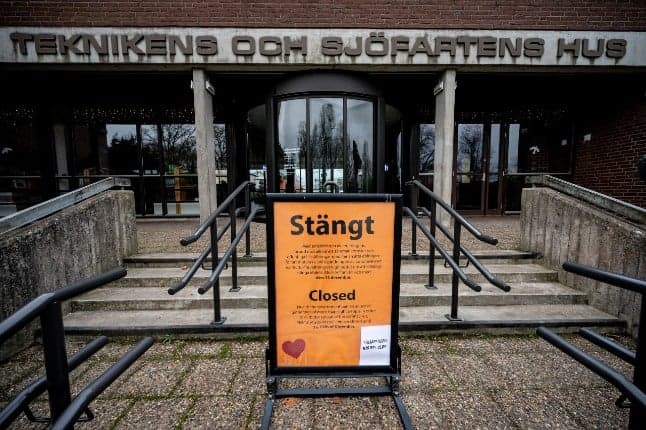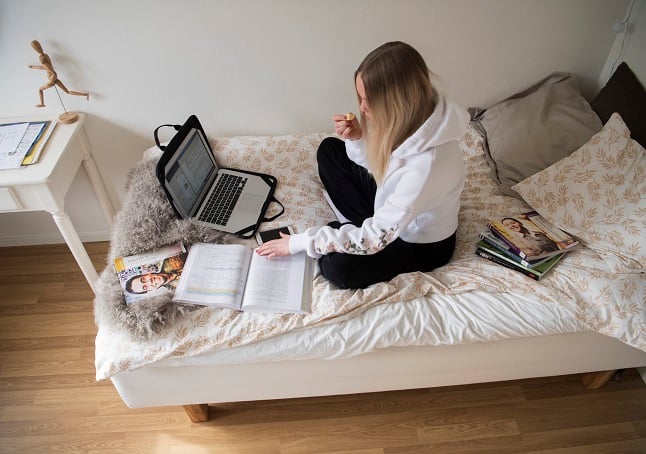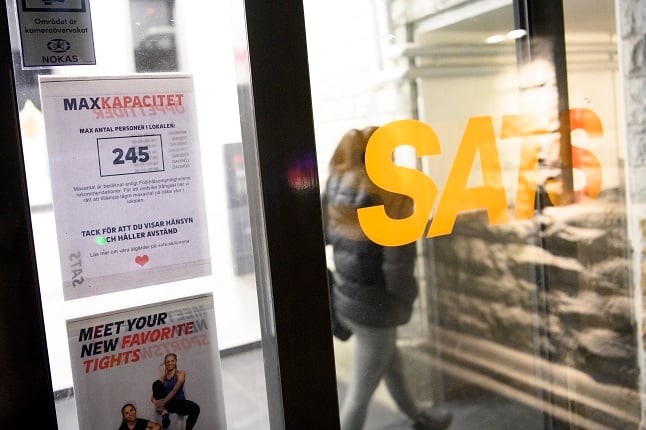LIST: What's open and what's closed in Sweden during the pandemic?

Sweden hasn't introduced a shutdown like many countries, but the pandemic has still led to many businesses closing while others are expected to ensure social distancing and limited visitor numbers. Here's a look at what's open and what's closed in Sweden today.
Shops: Open
Shops and businesses of all kinds may remain open. They should limit the number of customers to no more than one per ten square metres of usable space, and this limit should be clearly stated at all entrances. Since March 6th, there has also been a maximum limit of 500 customers regardless of the size of the store, although this does not apply to malls. Shops must also try to ensure that customer shop alone and not in groups.
Restaurants, bars and cafes: Early closing
Venues serving food and drink must close by 8pm, and no more than four people can be seated together. Those inside shopping malls can only serve takeaway food, and people can only visit alone.
Hairdressers and other beauty treatments: Open
These businesses may remain open, but are subject to the same rules as shops – limiting the number of customers to no more than one per ten square metres of usable space to ensure social distancing. Some hairdressers or beauty therapists may wear masks but it's up to individual businesses to decide. Contact your salon to find out the measures they are taking. Some Swedish regions have asked customers to wear masks in hairdressers and other environments where close contact with others cannot be avoided.
Primary schools: Open
Primary schools (grundskolor, typically for under-13s) are open in most cases, though they are allowed to close if for example there are not enough available staff.
Lower secondary schools: Mixed
For lower secondary schools (högstadiet, typically for 13-15-year-olds), it's up to the manager of the school (either the municipality or school board) to decide if they want to continue in-person teaching or switch entirely or partially to distance learning. This decision should be based on the spread of infection.
A study published last month by the National Agency for Education found that roughly half of municipalities were now teaching lower secondary pupils primarily in the classroom, up from a third in January.

A student studying at home. Photo: Fredrik Sandberg/TT
Schools for over-16s: Soon allowed to open
The current national recommendation is for upper secondary schools (gymnasieskolor, typically for over-16s) to offer distance learning, but from April 1st, this will no longer be the default, although regional infectious diseases doctors can recommend that pupils return to distance education temporarily.
The decision is up to the managers of the school, which might be the municipality or a school board in the case of independent schools, and should be based on the level of infection in the area.
Universities: Mostly closed
Most universities are offering teaching primarily remotely, though some parts may take place in-person such as practical lessons or exams.
Libraries: Open
Libraries are considered essential public services so can remain open, although in some municipalities they may be closed. In Malmö, libraries are not considered a meeting place, so visitors can loan and return books, but are asked not to stay for more than 30 minutes. In Gothenburg, visitors are asked only to come to collect and return books and use the free computers.
Gyms: Mixed
Gyms may remain open but are subject to the same rules as shops – limiting the number of customers to no more than one per ten square metres of usable space to ensure social distancing.
This applies to privately owned gym chains. Gyms that are run by local authorities, who have been told to keep all non-essential public services closed, are however generally closed (except for activities organised for children and teenagers).

A sign at a SATS gym stating the maximum number of people on site is 245. Photo: Johan Nilsson/TT
Public swimming pools: Mostly closed
Swimming pools are considered non-essential public services, and many municipalities have closed them to the general public since December, while leaving them open to schools. Stockholm will reassess its closures on April 12th, Malmö on March 31st, while Gothenburg's are closed until further notice.
Privately run swimming pools may be open and subject to the same rules as shops and gyms.
Cinemas: Mixed
There has been confusion over whether Sweden's cinemas are covered by limits on public events or the same rules as shops and businesses. Some major chains such as Filmstaden have closed their cinemas, but others remain open such as Folkets Bio and Svenska Bio. Local variations may apply.
Museums: Soon open
Sweden's state-run museums are considered non-essential public services, and most are have been closed since before Christmas. Museums are covered by new measures which came into effect on March 25th, requiring all museums to admit a maximum of one visitor per 10 square metres, and no more than 500. Stockholm's main museums are set to reopen on April 6th, Malmö's on March 29th, and Gothenburg has yet to announce opening dates.
Many private museums are also closed, and those which are open will have restrictions in place to ensure distancing, such as having a limit on the number of visitors allowed and/or requiring visitors to book tickets in advance.
Theatres: Closed
Theatres are currently covered by the law limiting public events to no more than eight people, which has led them to close.
Theme parks: Open
Theme parks were previously covered by the law limiting public events to no more than eight people. This has been changed under the new measures which came into effect on March 25th.
They can now open again, but must limit the number of visitors so that each has at least 20 square metres of space. Stockholm's Gröna Lund amusement park is set to open on April 24th, Gothenburg's Liseberg has yet to announce an opening date. Astrid Lindgren's Värld, a Pippi Longstocking theme park in Småland, will not open until May 28th.
Zoos: Open
Zoos have not been covered by the law limiting public events to no more than eight people, so many have remained open throughout the pandemic. They are now covered by the new measures which came into effect on March 25th, meaning they must limit the number of visitors so that each has at least 20 square metres of space.
Comments (1)
See Also
Shops: Open
Shops and businesses of all kinds may remain open. They should limit the number of customers to no more than one per ten square metres of usable space, and this limit should be clearly stated at all entrances. Since March 6th, there has also been a maximum limit of 500 customers regardless of the size of the store, although this does not apply to malls. Shops must also try to ensure that customer shop alone and not in groups.
Restaurants, bars and cafes: Early closing
Venues serving food and drink must close by 8pm, and no more than four people can be seated together. Those inside shopping malls can only serve takeaway food, and people can only visit alone.
Hairdressers and other beauty treatments: Open
These businesses may remain open, but are subject to the same rules as shops – limiting the number of customers to no more than one per ten square metres of usable space to ensure social distancing. Some hairdressers or beauty therapists may wear masks but it's up to individual businesses to decide. Contact your salon to find out the measures they are taking. Some Swedish regions have asked customers to wear masks in hairdressers and other environments where close contact with others cannot be avoided.
Primary schools: Open
Primary schools (grundskolor, typically for under-13s) are open in most cases, though they are allowed to close if for example there are not enough available staff.
Lower secondary schools: Mixed
For lower secondary schools (högstadiet, typically for 13-15-year-olds), it's up to the manager of the school (either the municipality or school board) to decide if they want to continue in-person teaching or switch entirely or partially to distance learning. This decision should be based on the spread of infection.
A study published last month by the National Agency for Education found that roughly half of municipalities were now teaching lower secondary pupils primarily in the classroom, up from a third in January.

A student studying at home. Photo: Fredrik Sandberg/TT
Schools for over-16s: Soon allowed to open
The current national recommendation is for upper secondary schools (gymnasieskolor, typically for over-16s) to offer distance learning, but from April 1st, this will no longer be the default, although regional infectious diseases doctors can recommend that pupils return to distance education temporarily.
The decision is up to the managers of the school, which might be the municipality or a school board in the case of independent schools, and should be based on the level of infection in the area.
Universities: Mostly closed
Most universities are offering teaching primarily remotely, though some parts may take place in-person such as practical lessons or exams.
Libraries: Open
Libraries are considered essential public services so can remain open, although in some municipalities they may be closed. In Malmö, libraries are not considered a meeting place, so visitors can loan and return books, but are asked not to stay for more than 30 minutes. In Gothenburg, visitors are asked only to come to collect and return books and use the free computers.
Gyms: Mixed
Gyms may remain open but are subject to the same rules as shops – limiting the number of customers to no more than one per ten square metres of usable space to ensure social distancing.
This applies to privately owned gym chains. Gyms that are run by local authorities, who have been told to keep all non-essential public services closed, are however generally closed (except for activities organised for children and teenagers).

A sign at a SATS gym stating the maximum number of people on site is 245. Photo: Johan Nilsson/TT
Public swimming pools: Mostly closed
Swimming pools are considered non-essential public services, and many municipalities have closed them to the general public since December, while leaving them open to schools. Stockholm will reassess its closures on April 12th, Malmö on March 31st, while Gothenburg's are closed until further notice.
Privately run swimming pools may be open and subject to the same rules as shops and gyms.
Cinemas: Mixed
There has been confusion over whether Sweden's cinemas are covered by limits on public events or the same rules as shops and businesses. Some major chains such as Filmstaden have closed their cinemas, but others remain open such as Folkets Bio and Svenska Bio. Local variations may apply.
Museums: Soon open
Sweden's state-run museums are considered non-essential public services, and most are have been closed since before Christmas. Museums are covered by new measures which came into effect on March 25th, requiring all museums to admit a maximum of one visitor per 10 square metres, and no more than 500. Stockholm's main museums are set to reopen on April 6th, Malmö's on March 29th, and Gothenburg has yet to announce opening dates.
Many private museums are also closed, and those which are open will have restrictions in place to ensure distancing, such as having a limit on the number of visitors allowed and/or requiring visitors to book tickets in advance.
Theatres: Closed
Theatres are currently covered by the law limiting public events to no more than eight people, which has led them to close.
Theme parks: Open
Theme parks were previously covered by the law limiting public events to no more than eight people. This has been changed under the new measures which came into effect on March 25th.
They can now open again, but must limit the number of visitors so that each has at least 20 square metres of space. Stockholm's Gröna Lund amusement park is set to open on April 24th, Gothenburg's Liseberg has yet to announce an opening date. Astrid Lindgren's Värld, a Pippi Longstocking theme park in Småland, will not open until May 28th.
Zoos: Open
Zoos have not been covered by the law limiting public events to no more than eight people, so many have remained open throughout the pandemic. They are now covered by the new measures which came into effect on March 25th, meaning they must limit the number of visitors so that each has at least 20 square metres of space.
Join the conversation in our comments section below. Share your own views and experience and if you have a question or suggestion for our journalists then email us at [email protected].
Please keep comments civil, constructive and on topic – and make sure to read our terms of use before getting involved.
Please log in here to leave a comment.